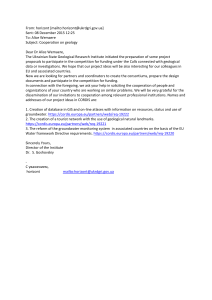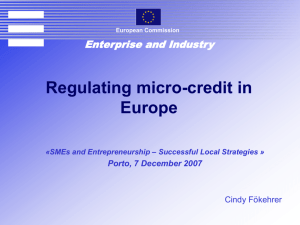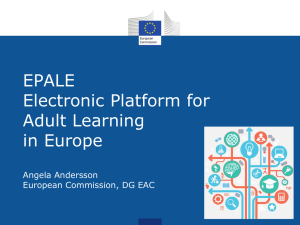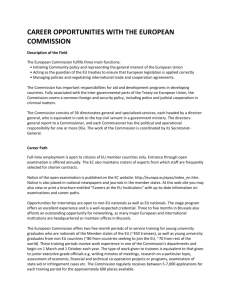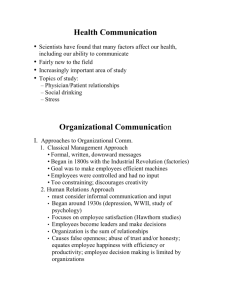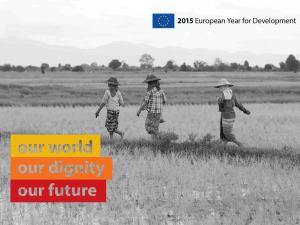EUROPEAN UNION’S RESEARCH AND EDUCATION PROGRAMMES FOR NON-EU COUNTRIES
advertisement
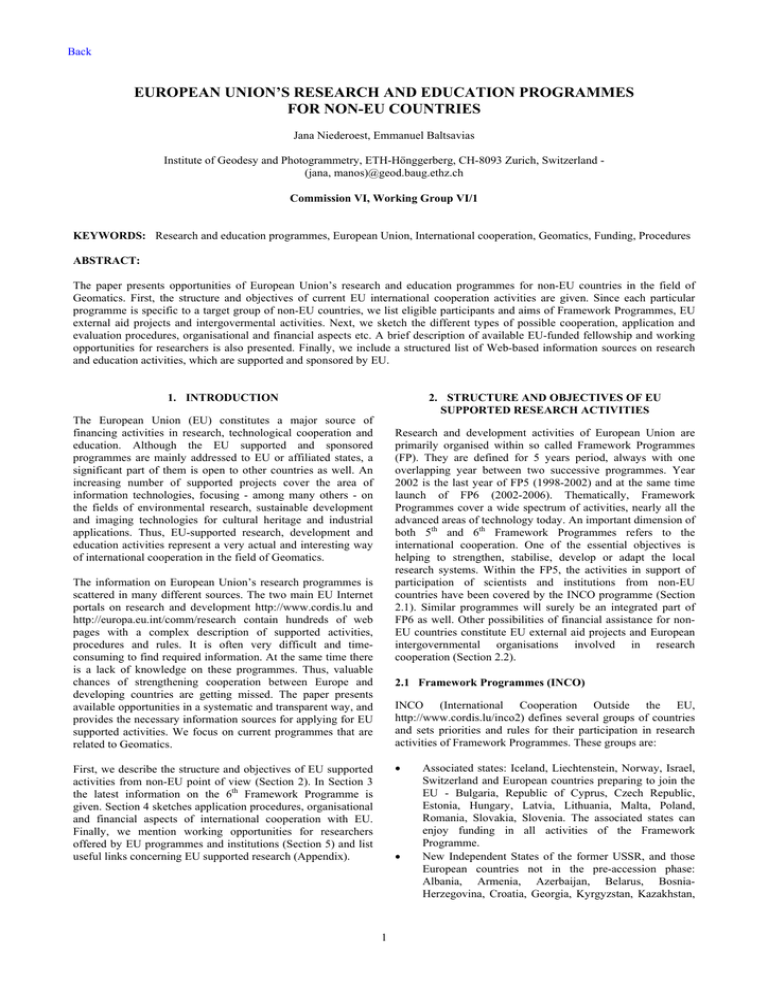
Back EUROPEAN UNION’S RESEARCH AND EDUCATION PROGRAMMES FOR NON-EU COUNTRIES Jana Niederoest, Emmanuel Baltsavias Institute of Geodesy and Photogrammetry, ETH-Hönggerberg, CH-8093 Zurich, Switzerland (jana, manos)@geod.baug.ethz.ch Commission VI, Working Group VI/1 KEYWORDS: Research and education programmes, European Union, International cooperation, Geomatics, Funding, Procedures ABSTRACT: The paper presents opportunities of European Union’s research and education programmes for non-EU countries in the field of Geomatics. First, the structure and objectives of current EU international cooperation activities are given. Since each particular programme is specific to a target group of non-EU countries, we list eligible participants and aims of Framework Programmes, EU external aid projects and intergovermental activities. Next, we sketch the different types of possible cooperation, application and evaluation procedures, organisational and financial aspects etc. A brief description of available EU-funded fellowship and working opportunities for researchers is also presented. Finally, we include a structured list of Web-based information sources on research and education activities, which are supported and sponsored by EU. 1. INTRODUCTION 2. STRUCTURE AND OBJECTIVES OF EU SUPPORTED RESEARCH ACTIVITIES The European Union (EU) constitutes a major source of financing activities in research, technological cooperation and education. Although the EU supported and sponsored programmes are mainly addressed to EU or affiliated states, a significant part of them is open to other countries as well. An increasing number of supported projects cover the area of information technologies, focusing - among many others - on the fields of environmental research, sustainable development and imaging technologies for cultural heritage and industrial applications. Thus, EU-supported research, development and education activities represent a very actual and interesting way of international cooperation in the field of Geomatics. Research and development activities of European Union are primarily organised within so called Framework Programmes (FP). They are defined for 5 years period, always with one overlapping year between two successive programmes. Year 2002 is the last year of FP5 (1998-2002) and at the same time launch of FP6 (2002-2006). Thematically, Framework Programmes cover a wide spectrum of activities, nearly all the advanced areas of technology today. An important dimension of both 5th and 6th Framework Programmes refers to the international cooperation. One of the essential objectives is helping to strengthen, stabilise, develop or adapt the local research systems. Within the FP5, the activities in support of participation of scientists and institutions from non-EU countries have been covered by the INCO programme (Section 2.1). Similar programmes will surely be an integrated part of FP6 as well. Other possibilities of financial assistance for nonEU countries constitute EU external aid projects and European intergovernmental organisations involved in research cooperation (Section 2.2). The information on European Union’s research programmes is scattered in many different sources. The two main EU Internet portals on research and development http://www.cordis.lu and http://europa.eu.int/comm/research contain hundreds of web pages with a complex description of supported activities, procedures and rules. It is often very difficult and timeconsuming to find required information. At the same time there is a lack of knowledge on these programmes. Thus, valuable chances of strengthening cooperation between Europe and developing countries are getting missed. The paper presents available opportunities in a systematic and transparent way, and provides the necessary information sources for applying for EU supported activities. We focus on current programmes that are related to Geomatics. 2.1 Framework Programmes (INCO) INCO (International Cooperation Outside the EU, http://www.cordis.lu/inco2) defines several groups of countries and sets priorities and rules for their participation in research activities of Framework Programmes. These groups are: • First, we describe the structure and objectives of EU supported activities from non-EU point of view (Section 2). In Section 3 the latest information on the 6th Framework Programme is given. Section 4 sketches application procedures, organisational and financial aspects of international cooperation with EU. Finally, we mention working opportunities for researchers offered by EU programmes and institutions (Section 5) and list useful links concerning EU supported research (Appendix). • 1 Associated states: Iceland, Liechtenstein, Norway, Israel, Switzerland and European countries preparing to join the EU - Bulgaria, Republic of Cyprus, Czech Republic, Estonia, Hungary, Latvia, Lithuania, Malta, Poland, Romania, Slovakia, Slovenia. The associated states can enjoy funding in all activities of the Framework Programme. New Independent States of the former USSR, and those European countries not in the pre-accession phase: Albania, Armenia, Azerbaijan, Belarus, BosniaHerzegovina, Croatia, Georgia, Kyrgyzstan, Kazakhstan, The International Archives of the Photogrammetry, Remote Sensing and Spatial Information Sciences, Vol. XXXIV, Part 6, CVI Former Yugoslav Republic of Macedonia, Moldova, Mongolia, Russia, Tajikistan, Turkmenistan, Ukraine, Uzbekistan, Federal Republic of Yugoslavia. The INCO programme co-funds an international non-profit association INTAS (International Association for the promotion of cooperation with scientists from the Independent States of the former Soviet Union, http://www.intas.be). The relevant countries of this group can profit from a large number of INTAS activities. Mediterranean Partner Countries: Algeria, Egypt, Jordan, Lebanon, Morocco, Palestine Authority, Syria, Tunisia, Turkey, West Bank and Gaza Strip. The INCO programme to support these countries is called INCOMED. There are two issues of high importance within this programme: water management and preservation and restoration of cultural heritage. Developing Countries of Africa, Caribbean, Pacific, Asia and Latin America. Regional topics of these countries are addressed in a programme INCO-DEV. Participation of organisations from developing countries must reinforce regional partnership. • Generally, other countries than EU member and associated states may obtain an EU grant if it is essential for achieving the project's objectives. There are countries, which have assigned a cooperation agreement with EU (Argentina, Australia, Canada, China, Russia, South Africa, USA, India, Brazil, Chile, Ukraine; for latter four, negotiations are under way) and have thus greater possibilities of participation according to specifications in the agreement. Some of these cooperation agreements can be found at the web page http://www.cordis.lu/inco2/src/research.htm (for Argentina, Brazil, China, Cyprus and India). • • • • • Research projects are usually not fully funded by the EU; they are funded on a shared cost basis, which is normally 50% of the project costs. On the other hand, the eligible costs of coordinating concerted actions and some accompanying measures (travel costs, organisation of workshops etc.) may be fully funded. There are also some types of projects, which can obtain full funding of all project costs (e.g. so called thematic networks). Financial aspects of Framework Programmes are discussed in detail in Section 4.1.5. As an example, we list several cooperation projects related to Geomatics that have been supported by the INCO programme. Detailed information on these projects can be found by searching in databases at http://dbs.cordis.lu or http://www.cordis.lu/inco2/src/projects.htm: • “Assessment and Monitoring of Desertication Processes in Mongolia using Remote Sensing Methods and GIS”. The aim of the research is to assess the dynamics of vegetation degradation in Mongolia, and to establish a remote sensing and GIS-based monitoring system to control desertification. The funding covers 90% of project costs. The partners in this project – in execution till June 2003 – are following countries: Israel, Germany, Mongolia and Russia. “Management and Policy Options for the Sustainable Development of Communal Rangelands and their Communities in Southern Africa”. The objectives of the project are to evaluate options for improving rangeland and natural resources management, alternative income sources and the impacts of current policies on three southern African areas of great biological as well as social value. The contractors are environmental, agriculture and botanic institutions of United Kingdom, Spain, Norway, South Africa, Botswana, and Lesotho. The project is funded on share-cost basis, with EU providing 1.2 of 1.44 Mil. Euro. The project duration is 40 months, ending up in April 2005. “Advanced research centre for cultural heritage interdisciplinary projects”. The project supports elaborating of state-of-the-art reports in selected areas of European cultural heritage. From the acquired results it builds and maintains a special database on cultural heritage, which is accessible by modern electronic means. The project is devoted for states in pre-accession phase, provides full funding of project costs (435’000 Euro) and is in execution till September 2003. “Geo-environmental dynamics of Pantanal-Chaco, multitemporal study and previsional modelling”. Through the analysis of satellite images, aerial photographs and radar images taken during the last 30 years, the temporal evolution of the territory in the Pantanal-Chaco area was determined. The fieldwork was carried out to check key models for image interpretation and classification. The hydrological system of the Paraguay river basin was modelled and an environmental impact evaluation was performed. As a result, GIS databases have been assessed for the following themes: cover and use of the soil, vegetation, geology, geomorphology, hydrology, and hydrogeology. The project was completed in November 2000 by 5 contractors from Italy, Portugal, Brazil and Paraguay. 2.2 EU External Aid Projects and Intergovermental Organisations 2.2.1 EuropeAid Projects: More than 150 countries, territories and organisations are beneficiaries of the external financial instruments managed by EuropeAid Co-operation Office (http://europa.eu.int/comm/europeaid). This aid, funded by European Community budget and the European Development Fund, includes several programmes listed in following. “Geoinformation for Sustainable Management of Land and Water Resources in the Mediterranean Region”. The objectives of this project are to examine the need of the participating Mediterranean countries for monitoring land and water resources, the institutions and tools currently in use and the potential role of remote sensing as a tool for reaching a sustainable environment. A series of meetings are held that prepare a basis for all parties to work together on common problems. The project is in execution till the end of October 2003 with the full funding of project costs (310’000 Euro). There are 17 contractors involved from educational and research institutes of following counties: France, Italy, Spain, Portugal, Lebanon, Israel, Tunisia, Turkey, West Bank and Gaza Strip, Egypt, Jordan, Morocco. Asia and Latin America Region (ALA) • ASIA-LINK (http://europa.eu.int/comm/europeaid/projects/asialink/index_en.htm): ASIA-LINK is a programme for cooperation between institutions of higher education of EU members and Bangladesh, Bhutan, Brunei, Cambodia, China, East Timor, India, Indonesia, Laos, Malaysia, Maldives, Nepal, Pakistan, Philippines, Sri Lanka, 2 The International Archives of the Photogrammetry, Remote Sensing and Spatial Information Sciences, Vol. XXXIV, Part 6, CVI • • • • • Bahamas, Barbados, Belize, Benin, Botswana, Burkina Faso, Burundi, Cameroun, Cape Verde, Central African Republic, Chad, Comoros, Congo (Brazzaville), Congo (Kinshasa), Côte d'Ivoire, Djibouti, Dominica, Dominican republic, Equatorial Guinea, Eritrea, Ethiopia, Fiji, Gabon, Gambia, Ghana, Grenada, Guinea, Guinea-Bissau, Guyana, Haïti, Jamaica, Kenya, Kiribati, Lesotho, Liberia, Madagascar, Malawi, Mali, Mauritania, Mauritius, Mozambique, Namibia, Niger, Nigeria, Papua New Guinea, Rwanda, Saint Kitts and Nevis, Saint Lucia, Saint Vincent and the Grenadines, Samoa, Sao Tome and Principe, Senegal, Seychelles, Sierra Leone, Solomon Islands, Somalia, Sudan, Suriname, Swaziland, Tanzania, Togo, Tonga, Trinidad and Tobago, Tuvalu, Uganda, Vanuatu, Zambia and Zimbabwe. South Africa can participate under specific budget headings. Thailand, Vietnam. Grants are provided from 200’000 to 300’000 Euro and are restricted to 75% (exceptionally up to 90%) of total eligible project costs. ASIA-URBS (http://europa.eu.int/comm/europeaid/projects/asiaurbs/index_en.htm): The programme is targeted to local authorities wishing to work with other towns in the EU and Asia in order to improve some aspect of urban life for a local community. Following countries of Asia are eligible to participate: Bangladesh, Bhutan, Brunei Darussalam, Cambodia, China, India, Indonesia, Laos, Malaysia, Maldives, Nepal, Pakistan, Philippines, Singapore, Sri Lanka, Thailand, Vietnam. The total amount provided is 500’000 Euro. ASIA-IT&C (http://europa.eu.int/comm/europeaid/projects/asiaitc/html/main.htm): The programme can co-finance up to 80% of information technology and communication projects. Non-profit organisations in countries of EU and Afghanistan, Bangladesh, Bhutan, Brunei, Cambodia, China, East Timor, India, Indonesia, Laos, Malaysia, Maldives, Nepal, Pakistan, Philippines, Sri Lanka, Thailand, Vietnam can be involved with the programme. ALIS (Alliance for Information Society, http://europa.eu.int/comm/europeaid/projects/alis/index_e n.htm): It is a programme of the European Commission aiming to reinforce the partnership between the European Union and Latin America in the field of information technologies. It is open to all civil society entities. ALFA (América Latina - Formación Académica, http://europa.eu.int/comm/europeaid/projects/alfa/index_e n.htm): ALFA is a programme of cooperation between higher education institutions of the European Union and Latin America. Following Latin American countries can participate: Argentina, Bolivia, Brazil, Chile, Colombia, Costa Rica, Cuba, Ecuador, El Salvador, Guatemala, Honduras, Mexico, Nicaragua, Panama, Paraguay, Peru, Uruguay and Venezuela. Up to 25% of the project budget must be paid by participating institutions or another entity then EU. URB-AL (http://europa.eu.int/comm/europeaid/projects/urbal/index _en.cfm or http://www.urb-al.com): URB-AL is a decentralised cooperation programme aimed at towns, urban areas and other regions in the European Union and Latin America. Its objective is to establish direct and lasting partnerships between local authorities. The defined interest topics include conservation of historic urban contexts, urban environment etc. Mediterranean Region MEDA (http://europa.eu.int/comm/external_relations/euromed/meda.ht m): The MEDA programme covers Euro-Mediterranean and multilateral regional cooperation activities. It offers technical and financial support measures to accompany the reform of economic and social structures in the Mediterranean partner states. In the period of 1995-1999, 41% of financial commitments went to the development projects like education, environment and rural development. Following 12 countries are involved: Algeria, Cyprus, Egypt, Israel, Jordan, Lebanon, Malta, Morocco, Syria, Tunisia, Turkey and Gaza and the West Bank. Balkan Region CARDS (Community Assistance for Reconstruction, Development and Stabilisation, http://europa.eu.int/comm/europeaid/projects/cards/index_en.ht m): Its objective is to support the participation of Albania, Bosnia and Herzegovina, Croatia, the Federal Republic of Yugoslavia and the Former Yugoslavia Republic of Macedonia in the stabilisation and association process. Among other areas, CARDS programme provides funding for the development of transnational transport, energy and environment infrastructure strategies and supports regional cooperation (Regional Strategy Paper for 2002-2006, 2002). New Independent States of the Former USSR and Mongolia TACIS (http://europa.eu.int/comm/external_relations/tacis/intro/index.h tm): The programme provides grant-financed technical assistance to 13 countries of Eastern Europe and Central Asia (Armenia, Azerbaijan, Belarus, Georgia, Kazakhstan, Kyrgystan, Moldova, Mongolia, Russia, Tajikistan, Turkmenistan, Ukraine and Uzbekistan) and mainly aims at enhancing the transition process in these countries. The funding is allocated through national, regional and small project programmes addressing particular fields including environmental issues, infrastructure networks, cooperation in higher education etc. Additionally, there are three so-called EU Enlargement programmes to assist the applicant 10 countries of central Europe (Bulgaria, Czech Republic, Estonia, Hungary, Latvia, Lithuania, Poland, Romania, Slovakia and Slovenia) in their preparations for joining the European Union: Africa, Caribbean and Pacific (ACP) Region The European Development Fund (EDF) supports various regional cooperation programmes on education and development in Africa, Caribbean and Pacific region, like PALOP, SADC, CACEU etc. Information on these programmes is provided at http://europa.eu.int/comm/development/ paysreg_en.htm. Geomatics-related topics of EDF supported programmes include development of a concerted strategy to protect African forest ecosystems, preservation of cultural heritage, disaster monitoring, risk prevention etc. (Regional Indicative Programme for the Caribbean region, 1997, Regional Indicative Programme for Central Africa, Eighth EDF, 1997 and Regional Indicative Programme PALOP/European Community, Framework of Cooperation, 1997). Following 70 countries are concerned: Angola, Antigua and Barbuda, • 3 PHARE (http://europa.eu.int/comm/enlargement/pas/phare), covering mostly economic and management issues. The International Archives of the Photogrammetry, Remote Sensing and Spatial Information Sciences, Vol. XXXIV, Part 6, CVI • • “risky” research. Non-EU countries can obtain financing in integrated projects within budgets available for international cooperation. Rates of Community support are limited to 50% for research projects and 100% for certain consortium management and training activities. Networks of excellence aim at strengthening scientific and technological knowledge on a particular research topic by networking resources expertise and management needed to be a world force in that topic. It is expected that larger networks may involve several hundreds of researchers. Non-EU countries may get funding in context of programmes for international cooperation. The financial assistance will be provided in form of annual grants calculated according to number of engaged researchers. As a durable integration of the research activities of the network partners should be created, no financial dependence should compromise the continuation of the network beyond the period of EU granting. ISPA (http://europa.eu.int/comm/enlargement/pas/ispa.htm), which finances major environmental and transport infrastructure. SAPARD (Special Accession Programme for Agriculture and Rural Development, http://europa.eu.int/comm/enlargement/pas/sapard.htm), which finances major agricultural and rural development projects. 2.2.2 Intergovermental Organisations: EU cooperates with intergovermental organisations involved in research and development. This is particularly true of COST and EUREKA. Both provide instruments for developing partnerships in a broad range of national and international activities: • • COST (European Cooperation in the Field of Scientific and Technical Research, http://cost.cordis.lu) offers funding for coordination project costs such as workshops/conferences, travel costs for meetings, contributions to publications and short term scientific missions of researchers to visit other laboratories. Most of the European countries and several non-EU institutions (in Israel, Armenia, Australia, Canada, India, Japan, China, Russia, Ukraine and USA) already participate in COST under different forms and thus can profit from funding opportunities. EUREKA (http://www.eureka.be) is a pan-European Programme oriented to small and large companies in order to bring research and development efforts to praxis. It supports innovative projects in various fields. Today 31 countries are full EUREKA members (except of EU member states those are Croatia, Czech Republic, Estonia, Hungary, Iceland, Israel, Latvia, Lithuania, Norway, Poland, Romania, Russian Federation, Slovakia, Slovenia, Switzerland and Turkey). Albania, Bulgaria, Cyprus, Ukraine and Federal Republic of Yugoslavia are on the road to full membership. In addition, some EUREKA projects also have non-European organisations as participants. From 11 to 13 November 2002 the European Commission will hold a major conference to mark the launch of the FP6. The conference will be a forum to present the objectives and priorities of the Framework Programme and to explain rules for participation. At the same time it will provide a platform for scientific debate on topics addressed in FP6. The aims and results of projects carried out under past EU research programmes or other programmes involving international cooperation will be presented and complemented by the parallel exhibition. More detail on the event can be found on the web page http://europa.eu.int/comm/research/conferences/2002/index_en. html. A closer look at the priorities of international cooperation within FP6 documents shows that there is a good chance of Geomatics-related projects to obtain the funding. The specific international-oriented activities will cover particularly (Amended proposals for Council decisions, 2002): • • 3. THE SIXTH FRAMEWORK PROGRAMME (2002-2006) The Sixth Framework Programme (FP6) of European Community for research, technological development and demonstration is in preparation and due to start at the end of 2002. The Commission defined 7 priority thematic areas of research and proposed their indicative budget. Three thematic areas cover the field of Geomatics in particular: Sustainable development (funded by 2’120 Mil. Euro), Information Society technologies (3’600 Mil. Euro), and Aeronautics and Space (1’075 Mil. Euro). The world’s research community has been invited to assist in the definition of the scope of calls for proposals within these priority thematic areas. The results will be published in September 2002 and the first open calls can be expected by the end of the year. • In the case of the Mediterranean third countries, support of the development of the Euro-Mediterranean partnership, issues relating to environment, health and water issues, as well as protection of the cultural heritage. In the case of Russia, states of former Soviet Union and countries and other countries from Eastern Europe, stabilisation of research and development potential, issues relating to changes in the industrial production system, environment and health protection and various safety aspects. In the case of the developing countries, the problems of health and public health, food safety, and the rational exploitation of resources. The FP6 activities will endeavour to strengthen coordination and complementarity with programmes carried out by means of financial instruments mentioned in Section 2.2.1. 4. HOW TO PARTICIPATE IN EU SUPPORTED ACTIVITIES There are two new instruments included in proposals for FP6 activities: integrated projects and networks of excellence (Provisions for implementing integrated projects, 2002 and Provisions for implementing networks of excellence, 2002). Integrated projects are designed to support objective-driven research, where the primary deliverable is new knowledge. Under these objectives they may include more long-term or As there are two major financial instruments to support non-EU countries – Framework Programmes and EU external aid projects – the information sources and organisational procedures are in the following divided into two main subsections. 4 The International Archives of the Photogrammetry, Remote Sensing and Spatial Information Sciences, Vol. XXXIV, Part 6, CVI At the web page http://www.cordis.lu/fp5/src/eoi.htm CORDIS offers a free partners service to help organisations identify potential partners for participation in the European Union's research and development programmes. There are two ways of reaching it: registration of own organisation into the database or searching for suitable already registered partners. 4.1 Participation in Framework Programmes The gateway to research activities sponsored and supported by the EU in the context of Framework Programmes is called CORDIS – Community Research and Development Information Service (http://www.cordis.lu). It offers a free access to a wide range of information in 5 languages (English, German, Spanish, French and Italian) by providing searchable databases and an extensive document library. Available services include identification of research funding sources, finding partners to cooperate, sharing expertise and much more. As the FP6 has not been launched yet, the following subsections describe procedures valid within FP5. Although minor adaptations may occur in the new Framework Programme, it is not likely that from the potential participant’s point of view these organisational aspects would change significantly. We recommend using an advanced or professional search in all CORDIS databases (including a partners database) which is free but requires a registration. This can be done at http://dbs.cordis.lu/. In this way, the query is more reliable and offers more refining possibilities. As an example, we queried the partner database using a keyword “geo”. The search resulted to 43 Geomatics-related organisations, which are looking for a partner mostly in any target country. More than a half of them are established in an EU member or associated state, thus eligible to be a project coordinator. When restricting the query to the INCO programme with bigger chance to obtain the EU funding, there are still 7 EU members or associated entities. 4.1.1 Who Can Participate: The Framework Programme is open to all legal entities established in the EU member and associated states - e.g. individuals, companies, universities, research organisations, etc. including small and medium size enterprises. Other European countries (including those from the former Soviet Union, and Albania, Bosnia-Herzegovina, and the Former Yugoslav Republic of Macedonia) as well as those of the Mediterranean Partnership can also participate, as can international organisations and any country that has concluded a bilateral science and technology agreement. Finally, any entity from another country can be part of a consortium if its participation is of substantial added value for the programme. However, financial support is normally limited to participants from member and associated States although funding for partners from elsewhere is available in certain cases, e.g. when specified in a call for proposal of INCO programme. The document Guide for proposers, Part 2 (ftp://ftp.cordis.lu/pub/inco2/docs/e_pg2_en_200001.pdf) contains on pages 12-14 useful information on coordinators within INCO thematic areas. It also includes national contact points for EU member and associated states, INCO-MED and INCO-DEV programmes (pages 45-56). Similar information on contact points of nearly all non-EU countries is available at http://www.cordis.lu/inco2/src/contacts.htm. Finding an Open and Suitable “Call for Proposal” Most activities within the programme employ the mechanism of periodic calls, in which proposals are invited for submission within a defined timeframe. All open calls for proposals of the Framework Programme are available at the web page http://dbs.cordis.lu/cordiscgi/srchidadb?CALLER=open_tender. There is also a web page with calls for proposals specific to INCO programme: http://www.cordis.lu/inco2/calls/calls.htm. Some calls are very exactly specified, but there are some under INCO which are quite open for an own detailed definition (e.g. a call on “confirming an international role of community research”). The deadline for most of INCO calls of FP5 is up to July of 2002, although there are a few open till October 2002. The EU sponsored projects are coordinated by a project coordinator, which must be a participant coming from a member or associated state. Under certain circumstances, the scientific coordinator can be different from the financial and administrative coordinator, in which case the restriction applies only to the latter. The submitted project proposals should involve at least two independent legal entities established in two different member states or in a member state and an associated state. Preparation and Submission of Proposals The project proposal submission form consists of three parts: In the context of INCO-MED and INCO-DEV, the programmes for Mediterranean and developing countries, specific rules and procedures are defined. There are 3 types of research cooperations, so called shared cost actions, concerted actions and thematic networks. For shared cost actions a minimum of 4 partners are necessary (2 EU + 2 MED/DEV; 1 EU + 1 associated state + 2 MED/DEV). For concerted actions and thematic networks there must be a minimum of 6 partners (e.g. 3 EU + 3 MED/DEV; 1 EU + 2 associated states + 3 MED/DEV). • • 4.1.2 The Application Procedure: To apply for the participation in the Framework Programme, a non-EU organisation must go through three steps: • • • • Find a project coordinator and research partners Find an open and suitable call for proposal Prepare and submit proposal Part A, common to all calls collects necessary administrative information and financial data about the proposal and the proposers. It can be downloaded from the web page http://www.cordis.lu/fp5/src/forms_rtdp.htm. Guidelines for completing the forms are also available there. Part B describes in detail the nature of the work, which will be undertaken. It comprises a description of scientific and technological objectives, and the detailed workplan. This section must be anonymous, i.e. it may contain no information that reveals the identity of participants. Part C identifies and describes fully the partners and their role in the consortium and in the proposed project. Parts B and C are call-specific and consist largely of free text following a predetermined list of Section headings. For INCO programmes, these are detailed in the Guide for proposers, Part 2: ftp://ftp.cordis.lu/pub/inco2/docs/e_pg2_en_200001.pdf. Finding a Project Coordinator and Research Partners 5 The International Archives of the Photogrammetry, Remote Sensing and Spatial Information Sciences, Vol. XXXIV, Part 6, CVI Proposals may be submitted in any of the 11 official languages of the European Union. However, if the proposal is not in English, a translation of the full proposal would be of assistance to the evaluators. An English translation of the abstract and proposal summary should be included in Part A of the Proposal Submission Form. • To support completion and submission of proposals, a special tool has been designed and produced. It is called Protool and can be downloaded from the following address: http://www.cordis.lu/fp5/protool/. A checklist for submission of completed proposals is available at http://www.cordis.lu/inco2/src/gp2_iv9.htm. Proposals can be submitted either electronically or on paper to the address specified in the call. • • According to Guide for proposers, Part 1 (ftp://ftp.cordis.lu/pub/inco2/docs/e_pg1_en_200103.pdf), a number of different methods are used to calculate the Commission funding, depending on the type of action involved and on the participant’s capacity to identify his incurred costs. 4.1.3 The Evaluation and Contract: Received proposals are evaluated in accordance with the Evaluation manual (ftp://ftp.cordis.lu/pub/fp5/docs/e_em_en_200201.pdf). Within 2-3 months following the close of call, negotiations with successful proposals begin. Contracts are issued within the next 3-5 months and payment of the advance can be expected 60 days after the contract signature. The model contracts are available at http://www.cordis.lu/fp5/mod-cont.htm. The Community contribution is paid in Euro, in a number of regular installments based on cost claims submitted by participants with their reports. The supporting documents, which justify the project costs must be retained by participants to permit auditing by Commission services or other institutions. 4.2 Participation in EU External Aid Projects 4.1.4 The Organization and Realization of the Project: There is no unique scheme on the aspects of organisation and realisation of EU supported projects. However, the contract defines deliverables such as reports and cost statements, which must be submitted to the Commission in regular intervals. This is done via the project coordinator. Project deliverables are analysed to ensure that the project is meeting its objectives. The reports are also used to assess whether and in what manner the project should continue to be supported. During the project, partners are expected to attend at periodical meetings. EU external aid is usually provided under one of the programmes and instruments listed in Section 2.2.1. The Internet pages of these projects offer information on different level of detail; however, the main access to most of them is common (http://europa.eu.int/comm/europeaid/). The search facility of this site allows seeing current, expected and closed calls for all EuropeAid projects. A keyword query is not possible there. Some of the calls are published in the language of the target countries (often Spanish, Portuguese and French; an English version is mostly also available). The description of each call includes an exact information on: 4.1.5 Financial Aspects: Generally, there is no minimum or maximum project budget defined. For INCO projects in FP4, the average budget was about 400.000 - 700.000 Euro for a period of between 2 and 4 years. Of course, the amount can vary greatly as a function of the subject and the partnership involved. As already mentioned in Section 2.1, research projects are financed up to 50% of costs, usually with full funding for coordination and training concerned actions. However, budget limits for international cooperation programmes often allow higher financial assistance (up to 90% of total project costs). INCO projects may also be a part of socalled thematic networks, where a full funding is possible. • • • • • • Participants are required to identify and declare their eligible costs by the submission of cost statements based on the actual costs for the project execution. A cost is eligible only where it is necessary for the project, incurred during the project and is provided for in the contract. It will be reimbursed only if the amount has actually been spent and recorded in the accounts. No profit may be included. Project-specific items of following costs may be charged to the contract: • • • • • project performance; subcontracts to entities located outside the member and associated states require the prior approval of the Commission) Other specific costs (any cost necessary for the project, not falling within a defined category and having received the prior approval of the Commission will be reimbursed, e.g. seminars) Coordination costs (the costs of coordinator’s administrative personnel in charge of the administrative and financial coordination of the project) Indirect costs Name of the relevant programme, Eligible participants (natural and legal persons of target countries of each particular programme as mentioned under 2.2.1), Selection criteria (mostly administrative and technical compliance to fulfil requested tasks), Amount of financial support, Deadline for submission, Postal contact for submission etc. Applicants are requested to fill-in the appropriate application form available at http://europa.eu.int/comm/europeaid/tender/gestion/pg/b03_en. doc and http://europa.eu.int/comm/europeaid/tender/gestion/pg/e03_en.h tm. Useful documents are: • Personnel costs Costs of durable equipment (calculated according to provided formulas) Travel and subsistence Consumables and computing Subcontractors (subcontractors may be included under certain conditions where this proves necessary for the • 6 Practical Guide to EC external aid contract procedures (http://europa.eu.int/comm/europeaid/tender/gestion/pg/p g_en.pdf) Practical Guide to PHARE, ISPA and SAPARD contract procedures (http://europa.eu.int/comm/europeaid/tender/gestion/pg/p g_phare_en.pdf) The International Archives of the Photogrammetry, Remote Sensing and Spatial Information Sciences, Vol. XXXIV, Part 6, CVI • quite some programmes, which can offer extensive funding of diverse projects in the field of Geomatics. Although rather complex, all information sources on EU programmes are Webbased and very detailed which ensures equal access and fair treatment of all interested parties. Thus, EU supported and sponsored programmes can contribute to strengthening international cooperation between Europe and the rest of the world, as well as developing regional contacts among non-EU countries. Standard contracts (http://europa.eu.int/comm/europeaid/tender/usedoc/cont_ typ/index_en.htm) It is also recommended to check the webpage of the particular programme, under which the call is published, as the rules, procedures and documents can slightly differ from the general ones. There is no common partner search service for all EuropeAid programmes. Nevertheless, some programmes provide this facility on their own webpages, including a list of national contact points (e.g. ASIA IT&C, Tacis and Phare). 7. REFERENCES Amended proposals for Council decisions, 2002. ftp://ftp.cordis.lu/pub/rtd2002/docs/fp6sp_amended_0102.pdf, pp. 8, 12, 46-56 (accessed 23 April 2002 from http://www.cordis.lu/rtd2002/background.htm). 5. FELLOWSHIP AND WORKING OPPORTUNITIES Provisions for implementing integrated projects, 2002. ftp://ftp.cordis.lu/pub/rtd2002/docs/fp6_ip_280202.pdf (accessed 23 April 2002 from http://www.cordis.lu/rtd2002/fpactivities/instruments.htm). One of the individual programmes of FP5 is the “Improving Human Research Potential” programme (http://www.cordis.lu/improving/), called “Human Resources and Mobility” in FP6 (http://www.cordis.lu/rtd2002/fpactivities/mobility.htm). It supports training and mobility of researchers from all scientific fields. There is a wide range of opportunities available for young to senior scientists, and for research teams, universities, companies and other organisations. The programme provides grants for pre- and postdoctoral studies, supports participation in scientific conferences, awards outstanding scientists and research teams etc. The programme is open for applicants from EU member and associated states and for those who have resided in an EU member state for at least five years immediately prior to their appointment. Provisions for implementing networks of excellence, 2002. ftp://ftp.cordis.lu/pub/rtd2002/docs/fp6_noe_280202.pdf (accessed 23 April 2002 from http://www.cordis.lu/rtd2002/fpactivities/instruments.htm). Regional Indicative Programme for the Caribbean region, 1997. http://europa.eu.int/comm/development/nip/rb_en.pdf (accessed 23 April 2002 from the web page http://europa.eu.int/comm/development/region/region_en.htm). Regional Indicative Programme for Central Africa, Eighth EDF, 1997. http://europa.eu.int/comm/development/nip/r8_en.pdf (accessed 23 April 2002 from the web page http://europa.eu.int/comm/development/region/region_en.htm). The INCO Programme provides an international experience to young scientists from both EU and developing world (http://www.cordis.lu/inco2/src/res-b.htm). Two fellowship schemes invest in talented researchers: • • Regional Indicative Programme PALOP/European Community, Framework of Cooperation, 1997. http://europa.eu.int/comm/development/nip/rp_en.pdf (accessed 23 April 2002 from the web page http://europa.eu.int/comm/development/region/region_en.htm). Bursaries for young researchers from Developing and Mediterranean Partner Countries. Granted are bursaries for a period of up to 6 months for training or for work on a particular experiment within EU or associated states. Fellowships to Japan for researchers from EU or associated states. Bursaries for a period of 24 months are granted, in order to carry out research in any of the natural or exact sciences. The bursary also includes intensive Japanese language training. Regional Strategy Paper for 2002-2006, 2002. CARDS Assistance Programme to the western Balkans. http://europa.eu.int/comm/external_relations/see/docs/cards/sp0 2_06.pdf (accessed 23 April 2002 from http://europa.eu.int/ comm/external_relations/see/news/ip01_1464.htm). Joint Research Centre (http://www.jrc.cec.eu.int/default.asp) with several institutes throughout Europe funds some schemes of working opportunities: • • • 8. APPENDIX. SUMMARY OF RELATED WEB LINKS Open Calls for Proposals, Tenders, Grants and Vacancies (these links should be checked from time to time for the latest information, as the sites are updated periodically) Visiting scientists, open to senior researchers from any country, for a period of 3-12 months. Detached National Experts, open for EU and partially for associated states, for a period of 3-36 months. Pre- and postdoctoral researcher fellows, open for applicants from EU member and associated States or residing in the Community for at least the last five years. • • 6. CONCLUSIONS • Specific research, education and development activities of European Union are open for non-EU countries, too. There are 7 Calls for proposals of the Framework Programme: http://dbs.cordis.lu/cordiscgi/srchidadb?CALLER=open_ten der Calls for proposals specific to the INCO programme for international cooperation with non-EU countries: http://www.cordis.lu/inco2/calls/calls.htm Tenders and grants of EuropeAid Coordination Center: http://europa.eu.int/comm/europeaid/tender/index_en.htm The International Archives of the Photogrammetry, Remote Sensing and Spatial Information Sciences, Vol. XXXIV, Part 6, CVI • • • • • • Vacancies for researchers offered in the context of the Human Potential Programme: http://www.cordis.lu/improving/code/vacancies.htm Vacancies for researchers at the Joint Research Centre: http://www.jrc.cec.eu.int/jobs News, vacancies and calls for proposals of COST: http://cost.cordis.lu/src/news.cfm Funds, grants, vacancies and fellowships of INTAS programme for scientists from states of former USSR: http://www.intas.be/mainfs.htm Fellowships for young researchers from non-EU countries provided by INCO: http://www.cordis.lu/inco2/src/res-b.htm • FAQ on EU research and FP5: http://europa.eu.int/comm/research/faq.html FAQ on EU portal web site: http://europa.eu.int/abouteuropa/faq/index_en.htm Organisational Aspects of Cooperation • Description of steps “From proposal to contract” within INCO programme: http://www.cordis.lu/inco2/src/protocont.htm • Guides for proposers, parts 1 and 2: ftp://ftp.cordis.lu/pub/inco2/docs/e_pg1_en_200103.pdf ftp://ftp.cordis.lu/pub/inco2/docs/e_pg2_en_200001.pdf • Evaluation of proposals: http://www.cordis.lu/inco2/src/gp1_evaluation.htm ftp://ftp.cordis.lu/pub/fp5/docs/e_em_en_200201.pdf • Information on contracts and a model contract: http://www.cordis.lu/inco2/src/gp1_iii5.htm http://www.cordis.lu/fp5/cpf.htm http://www.cordis.lu/fp5/mod-cont.htm • National contact points and committee delegates of INCO programme: http://www.cordis.lu/inco2/src/contacts.htm • EU cooperation agreements with some non-EU countries (Argentina, Brazil, China, Cyprus and India): http://www.cordis.lu/inco2/src/research.htm • Application forms for EuropeAid programmes: http://europa.eu.int/comm/europeaid/tender/gestion/pg/b03_ en.doc and http://europa.eu.int/comm/europeaid/tender/ gestion/pg/e03_en.htm • Practical Guide to EC external aid contract procedures: http://europa.eu.int/comm/europeaid/tender/gestion/pg/ pg_en.pdf • Practical Guide to PHARE, ISPA and SAPARD contract procedures: http://europa.eu.int/comm/europeaid/tender/gestion/pg/pg_p hare_en.pdf • Standard contracts for EuropeAid programmes: http://europa.eu.int/comm/europeaid/tender/usedoc/cont_ty p/index_en.htm Programmes and Funds of International Cooperation with Non-EU Countries • INCO: http://www.cordis.lu/inco2/ • INTAS: http://www.intas.be • ASIA-LINK: http://europa.eu.int/comm/europeaid/projects/asialink/index_en.htm • ASIA-URBS: http://europa.eu.int/comm/europeaid/projects/asiaurbs/index_en.htm • ASIA IT&C: http://europa.eu.int/comm/europeaid/projects/asiaitc/html/main.htm • ALIS: http://europa.eu.int/comm/europeaid/projects/alis/index_en. htm • ALFA: http://europa.eu.int/comm/europeaid/projects/alfa/index_en. htm • URB-AL: http://europa.eu.int/comm/europeaid/projects/urbal/index_e n.cfm and http://www.urb-al.com • EDF: http://europa.eu.int/comm/development/paysreg_en.htm • MEDA: http://europa.eu.int/comm/external_relations/euromed/meda .htm • CARDS: http://europa.eu.int/comm/europeaid/projects/cards/index_e n.htm • TACIS: http://europa.eu.int/comm/external_relations/tacis/intro/inde x.htm • PHARE: http://europa.eu.int/comm/enlargement/pas/phare • ISPA: http://europa.eu.int/comm/enlargement/pas/ispa.htm • SAPARD: http://europa.eu.int/comm/enlargement/pas/sapard.htm • COST: http://cost.cordis.lu • EUREKA: http://www.eureka.be • FP6 international cooperation: http://www.cordis.lu/rtd2002/fp-activities/inco.htm • FP6 Human resources and mobility: http://www.cordis.lu/rtd2002/fp-activities/mobility.htm • FAQ on Human Potential Programme: http://www.cordis.lu/improving/code/impfaq.htm Fellowships and Working Opportunities • Proposal submission forms of INCO fellowships and bursaries: http://www.cordis.lu/fp5/src/forms_inco.htm http://www.cordis.lu/fp5/src/forms_japan.htm. • Joint Research Centre: http://www.jrc.cec.eu.int/default.asp 8
